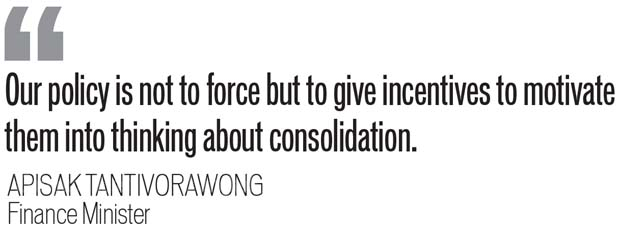Thailand: Tax incentives and banking consolidation
Proposed incentives to encourage mergers, combined with new banking standards, could lead to greater consolidation within Thailand’s banking sector, which the government hopes will strengthen lenders and complement plans to fast-track industrial growth. In December, Finance Minister Apisak Tantivorawong said his ministry was considering a plan to make mergers more appealing by offering tax incentives to local lenders and assisting companies with the costs of amalgamation.
The minister said the proposed measures would be aimed at bolstering the sector and better preparing domestic operators for increased international competition, but he released no further details. “Our policy is not to force but to give incentives to motivate them into thinking [about consolidation] … because Thailand does not have a bank that can be called a champion bank that can compete overseas,” Mr Apisak said.
Indeed, while many Thai companies are expanding their regional presence, offshore deals are still largely undertaken by banks outside Asean, with European, US or Japanese institutions responsible for financing the majority of mergers and acquisitions (M&A).
The competitiveness of local financial institutions in the region could be improved, however, once the Asean Banking Integration Framework (ABIF) is introduced in 2020. It will grant qualified banks greater access and flexibility to operate in other Asean markets, opening up expansion opportunities and increasing investment flows.
However, given the stringent capital and operational requirements, many banks may not qualify for ABIF status. A desire to do so could potentially encourage lenders to engage in mergers or acquisitions. This could lead to a greater role for Thai banks in the region.
Supporting development at home: In addition to making local banks more competitive abroad, the government’s proposals are designed to put the financial sector in a better position to support domestic growth.
 At present, many Thai businesses are expanding at a rate significantly higher than local banks, meaning individual lenders are not equipped to extend the levels of credit required by the business community.
At present, many Thai businesses are expanding at a rate significantly higher than local banks, meaning individual lenders are not equipped to extend the levels of credit required by the business community.
“Thai corporations are reliant on global banks for foreign currency financing, and as a result, these institutions are involved in almost all overseas activity undertaken by the Thai corporate sector,” Ornkanya Pibuldham, managing director and Thailand country officer for Bank of America Merrill Lynch, told Oxford Business Group (OBG).
However, the hoped-for realisation of the new Thailand 4.0 economic model, which aims to promote higher levels of investment in domestic industry to expand value- added sectors, could help ease the recent trend of capital moving offshore. The Thailand 4.0 blueprint has identified several sectors that can be further developed through the application of advanced technology, including next-generation automotive, tourism, agriculture, electronics and biotechnology, and others that can serve as growth enhancers, such as automation and robotics, aerospace, bioenergy, digital applications and health care.
Additionally, Thailand 4.0 could create increased investment potential in regional economies, as more local companies look to expand operations, subsequently boosting credit demand.
Mergers among top six uncertain: Despite the government’s best intentions, there are several factors that banks would have to consider when contemplating M&A, according to Kobsak Duangdee, secretary-general of the Thai Bankers’ Association. “The government’s idea is to merge the banks, but it may not happen so easily as the top six are strong,” he told OBG. “The medium-sized players may merge, but nothing is certain.”
Another factor that could deter lenders from considering a merger is the overall strength of the sector. Most operators, according to Mr Kobsak, are in a strong financial position with low levels of non-performing loans (NPLs) and solid compound annual growth rates.
While the banking sector remains liquid and well protected from NPLs, consolidation would ensure banks are better equipped to carry inactive loans on their books and be less at risk from any potential spike in bad credit. It could also better prepare banks to extend loans to sectors identified by the government as being most in need, such as small and medium-sized enterprises, seen as a significant contributor to the Thailand 4.0 programme.
Further reform expected next year: Further down the line, mergers among smaller-scale lenders could gather pace once International Financial Reporting Standards 9 (IFRS 9) come into force next year. The new accounting standards will require banks to set aside additional reserves to meet the demands of a more stringent loss-impairment model, while also lowering the threshold for recognition of expected losses over their full lifetime.
Smaller banks may find it more difficult to cover these requirements and meet other conditions under the Basel III international accords. That would leave mergers between medium-scale operators as one way for lenders to expand their asset and capital bases.
Source: https://www.bangkokpost.com/business/news/1427306/tax-incentives-and-banking-consolidation


 Thailand
Thailand




